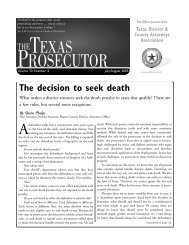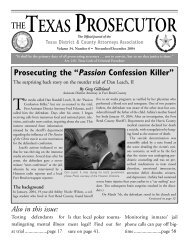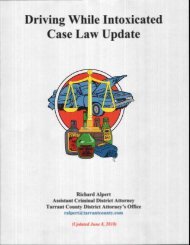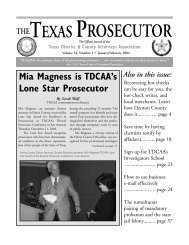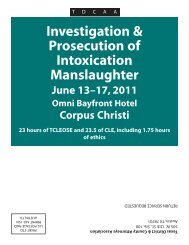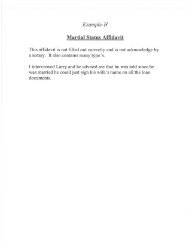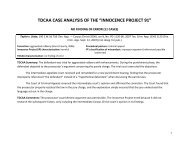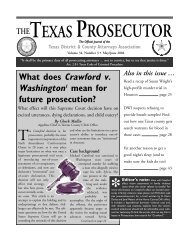Driving While Intoxicated Case Law Update - Texas District ...
Driving While Intoxicated Case Law Update - Texas District ...
Driving While Intoxicated Case Law Update - Texas District ...
You also want an ePaper? Increase the reach of your titles
YUMPU automatically turns print PDFs into web optimized ePapers that Google loves.
ecoming the focus of a DWI investigation at the time the question was asked did not convert the<br />
roadside sfop fo custodial interrogation.<br />
Loar v. State, 627 S.W.2d 399 (Tex.Crim.App. [panel op] 1981).<br />
Statement made by defendantthat he had'bne g/ass of wine' made during traffic stop, not product<br />
of custodial interrogation and is admissible.<br />
Abernathy v. State, 963 S.W.2d 822 (Tex.App.-San Antonio 1998, pet. ref'd).<br />
After stopping defendant, the officer smelled a moderate odor of intoxicants, noticed defendant's<br />
eyes were g/assy, asked him to get out of the vehicle, and if he had had anything to drink.<br />
Defendant responded that he had had a few drinks. The officer asked defendant to pertorm a<br />
series of three field sobriefy fesfs after which he again asked him how much he had had to drink<br />
and defendant said he ha! consumed four drinks. In holding both statementswere admissible, the<br />
Court found that all the measures employed by the officer until the time of the arrest were in<br />
pursuance of a temporary investigation to determine whether defendant was driving a motor vehicle<br />
while intoxicated. There was no coercive atmosphere of custodial interrogation as contemplated<br />
by Miranda and its progeny. No violations of the Fifth and Fourteenth Amendments have been<br />
shown, as defendant simply was not subjected to custodial interrogation.<br />
Gallowav v. State, 778 S.W.2d 111(Tex.App.-Houston [14th Dist.] 1989, no pet.).<br />
Massie v. State,744S.W.2d314 (Tex.App.-Dallas 1988, pet. ref'd).<br />
Questioning that occurs as normal incident of arrest and custody is not interrogation. Officer upon<br />
approaching defendant asked if he had been drinking and defendant replied "Yes, l've been<br />
drinking a lot." That statemenf is admissible.<br />
State v. Waldrop, 7 S.W.3d 836 (Tex.App.-Austin 1999, no pet.).<br />
A roadside sfop does not place a driver in custody to the degree that Miranda warnings need to be<br />
administered. In this case, the Court reversed an order of the trial court suppressrng statements<br />
about when and where a defendant was drinking and his comment that he was drunk when all<br />
statements were made after the stop but before field sobriefy fesfs were conducted.<br />
Hutto v. State, 977 S.W.2d 855 (Tex.App.-Houston [14th Dist.] 1998, no pet.).<br />
Before an accident investigation becomes a cusfodial situation where Miranda protection is<br />
available there must be: 1) evidence that defendant subjectively perceived he was notfree to leave;<br />
2) a manifestation by the officer to the defendant of his intent to arrest him. ln this case, the Court<br />
found the officer's conducting field sobriety testing and questioning of defendant did not convert<br />
roadside stop into arrest and that oral statements of defendant were admissible.<br />
53



